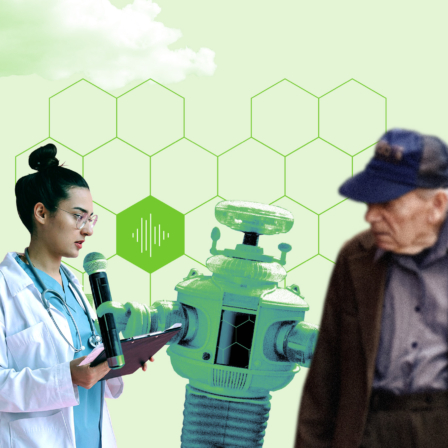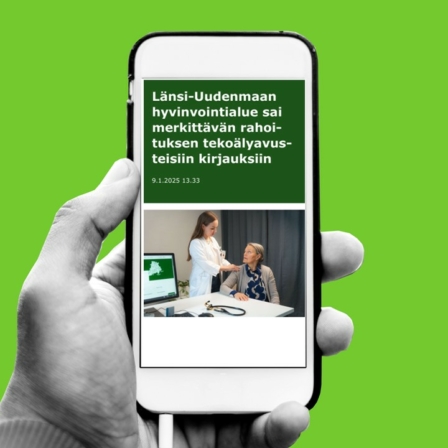AI in social and health services
Greater use of artificial intelligence can provide ways to deliver social and health services better and more efficiently. Sitra’s projects tested the use of AI in social and health services in three wellbeing services counties in Finland. The final results will be published in spring 2025.
What is it about?
Social and health services are beset by a number of challenges, including labour shortages, cost pressures and poor access to services. In principle, artificial intelligence (AI) can have a positive impact on all these issues.
We run four pilot projects with three wellbeing services counties to test the use of AI in social and health services. A particular focus of the projects is whether they can deliver cost savings.
The pilots focused on two of the wellbeing services counties’ roles: patient record keeping and supporting the functional capacity of older people. AI will be applied to both, partly using existing products.
Projects
The projects were implemented in 2024 and the final results will be published in spring 2025.
Using AI to record patient data
Medical record keeping is a manual task that has long been attempted to be automated. It takes up a significant amount of doctors’ and nurses’ time, reducing the amount of time spent on actual care.
Automation has already been able to replace some of this work. For example, transcribing dictation no longer requires the current number of staff. AI can take this further and, in the future, patient information could be automatically entered into healthcare systems.
The pilot projects tested the use of AI to record patient data in three wellbeing services counties, North Ostrobothnia (Pohde), Kanta-Häme (Oma Häme) and Western Uusimaa. In the pilot projects of Pohde and Oma Häme, the trial was initiated through self-development and made use of the existing ChatGPT technology. In Western Uusimaa, a new solution developed by a start-up company was used.
The projects gathered experiences of implementing AI solutions in social and health services and, to some extent, of their use. The projects ended in December 2024.
Results:
Currently, a professional in the social and health services spends 3 hours 15 minutes a day recording information (in Finnish and in Swedish). Preliminary results show that the use of AI for recording saves time for other tasks. For example, a 30% time saving on the work of 23,500 Finnish doctors would mean a saving of almost 3,100 person-years in healthcare.
The pilot projects showed that AI technology is sufficiently advanced to be applied to social and health services. Wider use of AI will require changes in legislation, funding to disseminate new solutions and improving data quality, among other things. The results are promising, so the Ministry of Social Affairs and Health allocated funding for the following project in Western Uusimaa (news in Finnish and in Swedish) and Kanta-Häme (news in Finnish).
A more detailed summary of the results will be published during January and February 2025.
Project implemented by:
Wellbeing services county of North Ostrobothnia (Pohde)
contact: Heikki Mikkonen, Manager of Digital Services, firstname.lastname (at) pohde.fi
Wellbeing services county of Kanta-Häme
contact: Katja Antikainen, Chief Data Officer,
firstname.lastname (at) omahame.fi
Wellbeing services county of Western Uusimaa
contact: Johan Sanmark, Director of research, development and innovation, firstname.lastname (at) luvn.fi
Using AI to promote the functional capacity of older people
Unforeseen events that affect the health of older people, such as falls, various pain conditions and a decline in social functioning, are situations that place a burden on both the patient and the social and healthcare system.
AI can be used to make predictions about anticipated events to support professionals’ decision-making. Predictions can help professionals to change treatment to prevent, for example, a decline in capacity or a fall.
The project gathered experiences of implementing AI solutions in social and health services and, to some extent, of their use. The project ended in December 2024 and results will be published later in spring 2025.
Project implemented by:
Wellbeing services county of Kanta-Häme
contact: Katja Antikainen, Chief Data Officer,
firstname.lastname (at) omahame.fi


